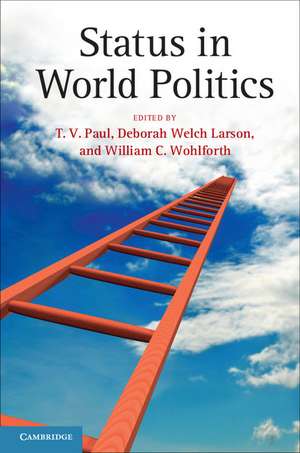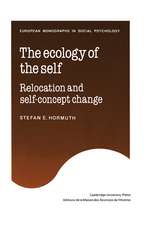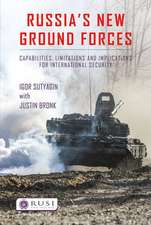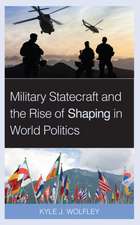Status in World Politics
Editat de T. V. Paul, Deborah Welch Larson, William C. Wohlforthen Limba Engleză Hardback – 6 apr 2014
| Toate formatele și edițiile | Preț | Express |
|---|---|---|
| Paperback (1) | 264.74 lei 6-8 săpt. | |
| Cambridge University Press – 6 apr 2014 | 264.74 lei 6-8 săpt. | |
| Hardback (1) | 556.38 lei 6-8 săpt. | |
| Cambridge University Press – 6 apr 2014 | 556.38 lei 6-8 săpt. |
Preț: 556.38 lei
Preț vechi: 625.15 lei
-11% Nou
Puncte Express: 835
Preț estimativ în valută:
106.46€ • 111.38$ • 88.44£
106.46€ • 111.38$ • 88.44£
Carte tipărită la comandă
Livrare economică 03-17 aprilie
Preluare comenzi: 021 569.72.76
Specificații
ISBN-13: 9781107059276
ISBN-10: 1107059275
Pagini: 320
Ilustrații: 5 b/w illus. 11 tables
Dimensiuni: 157 x 235 x 22 mm
Greutate: 0.57 kg
Ediția:New.
Editura: Cambridge University Press
Colecția Cambridge University Press
Locul publicării:New York, United States
ISBN-10: 1107059275
Pagini: 320
Ilustrații: 5 b/w illus. 11 tables
Dimensiuni: 157 x 235 x 22 mm
Greutate: 0.57 kg
Ediția:New.
Editura: Cambridge University Press
Colecția Cambridge University Press
Locul publicării:New York, United States
Cuprins
Part I. Introduction: 1. Status and world order Deborah Welch Larson, T. V. Paul and William C. Wohlforth; Part II. Admission into the Great-Power Club: 2. Managing rising powers: the role of status concerns Deborah Welch Larson and Alexei Shevchenko; 3. Status considerations in international politics and the rise of regional powers Thomas J. Volgy, Renato Corbetta, J. Patrick Rhamey, Jr, Ryan G. Baird and Keith A. Grant; 4. Status is cultural: Durkheimian Poles and Weberian Russians seek great-power status Iver B. Neumann; Part III. Status Signaling: 5. Status dilemmas and interstate conflict William C. Wohlforth; 6. Status signaling, multiple audiences, and China's blue-water naval ambition Xiaoyu Pu and Randall L. Schweller; Part IV. International Institutions and Status: 7. Status accommodation through institutional means: India's rise and the global order T. V. Paul and Mahesh Shankar; 8. Setting status in stone: the negotiation of international institutional privileges Vincent Pouliot; Part V. Status, Authority, and Structure: 9. Status conflict, hierarchies, and interpretation dilemmas William R. Thompson; 10. Status, authority, and the end of the American century David A. Lake; Part VI. Conclusions: 11. Why status matters in world politics Anne L. Clunan.
Recenzii
'In World War I status disagreements contributed to the war. Once again in the twenty-first century status is becoming an important issue. Definitively and thoroughly examining status from a number of angles, this book is an indispensable source on the subject.' Charles Doran, Andrew W. Mellon Professor of International Relations, School of Advanced International Studies, Johns Hopkins University
'Status in World Politics is a major contribution to a heretofore neglected topic. The debate over 'status' … its meaning, causes and consequences … offered by the authors in this volume is an essential introduction to forces that have shaped world politics and will be part of the currency of competition defining the new world order.' Michael W. Doyle, Columbia University
'Quality essays explore and evaluate the influence of status in the foreign policy behaviour of the great powers. The analyses are rich in theoretical insights and policy implications, and are highly relevant in our era of power transitions.' K. J. Holsti, Professor Emeritus, University of British Columbia
'This is a path-breaking volume. It fills an important intellectual gap by exploring with nuance and sophistication the role that status plays in shaping interstate relations and the prospects for stability in a changing world.' Charles A. Kupchan, Georgetown University, Council on Foreign Relations, and author of No One's World
'T. V. Paul, Deborah Welch Larson, and William Wohlforth have given IR scholars the right book at the right time. The study of great power relations traditionally focuses on power. Status in World Politics calls our attention to the fact that great powers - especially rising ones - seek acknowledgment of their newfound position in the international system. This book fills a gap in the study of great power behaviour and draws our attention to the fact that prestige and status are important drivers of great power strategies. This is a path breaking book that is sure to inspire new research on this important topic.' Christopher Layne, University Distinguished Professor and Robert M. Gates Chair in National Security, George H. W. Bush School of Government and Public Service, Texas A and M University
'States seek status as an end in itself as it enhances the self-esteem of leaders and peoples alike. Contributors to this volume offer useful insights into how status is achieved and signalled and how conflicts can arise when leaders of different countries make asymmetric assessments of their relative standing.' Richard Ned Lebow, Professor of International Political Theory, King's College London
'… [a] valuable book …' Pierre Hassner, Survival
'Status in World Politics is a major contribution to a heretofore neglected topic. The debate over 'status' … its meaning, causes and consequences … offered by the authors in this volume is an essential introduction to forces that have shaped world politics and will be part of the currency of competition defining the new world order.' Michael W. Doyle, Columbia University
'Quality essays explore and evaluate the influence of status in the foreign policy behaviour of the great powers. The analyses are rich in theoretical insights and policy implications, and are highly relevant in our era of power transitions.' K. J. Holsti, Professor Emeritus, University of British Columbia
'This is a path-breaking volume. It fills an important intellectual gap by exploring with nuance and sophistication the role that status plays in shaping interstate relations and the prospects for stability in a changing world.' Charles A. Kupchan, Georgetown University, Council on Foreign Relations, and author of No One's World
'T. V. Paul, Deborah Welch Larson, and William Wohlforth have given IR scholars the right book at the right time. The study of great power relations traditionally focuses on power. Status in World Politics calls our attention to the fact that great powers - especially rising ones - seek acknowledgment of their newfound position in the international system. This book fills a gap in the study of great power behaviour and draws our attention to the fact that prestige and status are important drivers of great power strategies. This is a path breaking book that is sure to inspire new research on this important topic.' Christopher Layne, University Distinguished Professor and Robert M. Gates Chair in National Security, George H. W. Bush School of Government and Public Service, Texas A and M University
'States seek status as an end in itself as it enhances the self-esteem of leaders and peoples alike. Contributors to this volume offer useful insights into how status is achieved and signalled and how conflicts can arise when leaders of different countries make asymmetric assessments of their relative standing.' Richard Ned Lebow, Professor of International Political Theory, King's College London
'… [a] valuable book …' Pierre Hassner, Survival
Descriere
A systematic study of why rising powers seek greater status in world politics and when dominant powers recognize their claims.



























